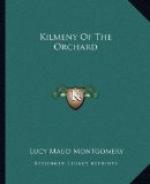“No reason whatever, if you will allow me the privilege. You have a very lovely name—the very name you ought to have.”
“I am glad you like it. Do you know that I was called after my grandmother and she was called after a girl in a poem? Aunt Janet has never liked my name, although she liked my grandmother. But I am glad you like both my name and me. I was afraid you would not like me because I cannot speak.”
“You can speak through your music, Kilmeny.”
She looked pleased. “How well you understand,” she wrote. “Yes, I cannot speak or sing as other people can, but I can make my violin say things for me.”
“Do you compose your own music?” he asked. But he saw she did not understand him. “I mean, did any one ever teach you the music you played here that evening?”
“Oh, no. It just came as I thought. It has always been that way. When I was very little Neil taught me to hold the violin and the bow, and the rest all came of itself. My violin once belonged to Neil, but he gave it to me. Neil is very good and kind to me, but I like you better. Tell me about yourself.”
The wonder of her grew upon him with every passing moment. How lovely she was! What dear little ways and gestures she had—ways and gestures as artless and unstudied as they were effective. And how strangely little her dumbness seemed to matter after all! She wrote so quickly and easily, her eyes and smile gave such expression to her mobile face, that voice was hardly missed.
They lingered in the orchard until the long, languid shadows of the trees crept to their feet. It was just after sunset and the distant hills were purple against the melting saffron of the sky in the west and the crystalline blue of the sky in the south. Eastward, just over the fir woods, were clouds, white and high heaped like snow mountains, and the westernmost of them shone with a rosy glow as of sunset on an Alpine height.
The higher worlds of air were still full of light—perfect, stainless light, unmarred of earth shadow; but down in the orchard and under the spruces the light had almost gone, giving place to a green, dewy dusk, made passionately sweet with the breath of the apple blossoms and mint, and the balsamic odours that rained down upon them from the firs.
Eric told her of his life, and the life in the great outer world, in which she was girlishly and eagerly interested. She asked him many questions about it—direct and incisive questions which showed that she had already formed decided opinions and views about it. Yet it was plain to be seen that she did not regard it as anything she might ever share herself. Hers was the dispassionate interest with which she might have listened to a tale of the land of fairy or of some great empire long passed away from earth.
Eric discovered that she had read a great deal of poetry and history, and a few books of biography and travel. She did not know what a novel meant and had never heard of one. Curiously enough, she was well informed regarding politics and current events, from the weekly paper for which her uncle subscribed.




